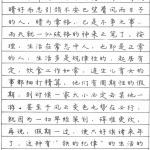You searched for mnemonics | Page 3 of 6 | Hacking Chinese Page 3
-
Review: The Outlier Dictionary of Chinese Characters
Outlier Linguistics Dictionary of Chinese characters is an excellent tool to help you understand and thereby learn Chinese characters more effectively. This is an in-depth review, covering the two versions of the dictionary, essential and expert, as well as other related products provided by outlier. There is also a 25% discount code for those who want to try the dictionary!
Read → -
Diversify how you study Chinese to learn more
How is it possible to spend 80 hours a week learning Chinese? And what can you learn from that, even if you find it hard to find any time to study whatsoever, with work and family taking up most of your time? This article aims at widening the scope of what it means to learn Chinese, and shows you ways you can learn that you probably haven’t thought of before!
Read → -
Chinese is fascinating and exciting, not weird and stupid
Languages are neither negative or positive in themselves; it’s all in the eye of the beholder. But does it matter what you think about Chinese language and culture? Is it harder to learn Mandarin if you think the language is weird and stupid? This article looks closer at this question, and argues that deliberately adopting a positive approach will lead to better and more enjoyable learning.
Read → -
Dealing with Chinese characters you keep mixing up
The more Chinese characters you learn, the harder it becomes to keep similar characters distinct. If you’re not careful, a pair or group of characters can generate a lot of extra work and frustration. The solution is to trace your errors and figure out why you get the characters wrong and, then deal with them decisively!
Read → -
5 levels of understanding Chinese characters: Superficial forms to deep structure
How much do you need to care about the actual composition and meaning of a Chinese character when learning it? In general, better understanding means it’s easier to learn, but is there a limit to how closely you should stick to actual etymology? This article explores the spectrum from using superficial images to real etymology from the perspective of a language learner.
Read → -
Does using colour to represent Mandarin tones make them easier to learn?
Some learning materials, apps and tools allow you to add colours to show Mandarin tones, but is this really helpful? This article discusses the ins and outs of using colour to learn and remember tones, along with some practical considerations.
Read → -
Unlocking Chinese: The Ultimate Guide for Beginners
The ultimate course for beginners Get the most out of your learning ⚡ Buy now – $128 ⚡ Buy with professional feedback – $288 Member area Successful students take control of their learning Others just follow along, hoping for the best Learning Chinese is a fascinating journey. It opens doors […]
Read → -
101 questions and answers about how to learn Chinese
This is the biggest collections of questions and answer about how to learn Chinese anywhere. The questions are sorted into categories, and each question is answered briefly before links to further information is provided. If you have a question about how to learn Chinese, you’re very likely to find the answer here! If your question hasn’t been answered, please consider leaving a comment!
Read → -
How to improve your Chinese handwriting
Learning to write Chinese by hand is a complex task. This article gives an overview of what it means to write by hand, answering questions like: “Do I need to learn to write by hand?”, “What skills does handwriting in Chinese require?” and” How do I improve my handwriting?”
Read → -
Learning to unicycle, learning anatomy and learning Chinese
Is learning Chinese more like learning to unicycle or like learning anatomy? It strongly depends on what we’re talking about more precisely. Some aspects of language learning are skills akin to unicycling, others are more about knowing and understanding.
Read →









